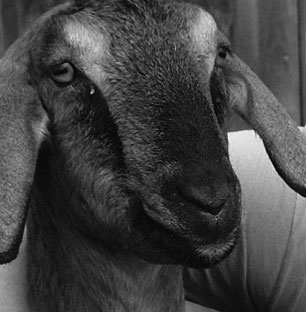News
Homegrown from goat’s milk
Kitchen science lesson evolves into skin-care business
By STACEY MORRIS
Contributing writer

STILLWATER, N.Y.
A typical day for Hal Mayes involves making upwards of 1,200 bars of goat’s milk soap at his Saratoga County farm and manufacturing plant.
Not so typical is the fact that his homegrown business regularly fields orders from virtually every continent. Because goat’s milk soap can be found just about anywhere nowadays, it may seem odd that
Mayes and his sister, Nell Turgeon, spend their days filling orders to send to Australia, Japan, Chicago and Los Angeles, as well as around the Northeast.
But the soaps produced by the siblings’ business, Alabu Skin Care, stand out in an increasingly crowded marketplace.
“Every bar of soap is 25 percent fresh goat milk,” Mayes explained. “Goat’s milk soap is pretty common, but most manufacturers use powdered or condensed milk instead of fresh, and neither have the
same butterfat content as fresh. We use a proprietary process that I developed to make the soap without burning the milk.”
Alabu Skin Care got started quite by accident in 1997, the result of a home-school science project and a goat-raising neighbor with a surplus of milk.
The neighbor, Dottie Cross, knew Hal and Nell were home-schooled and thought a soap-making venture would be a perfect chemistry experiment. The siblings showed up at Cross’ house with goggles and gloves,
and the rest is history.
“Our neighbor made the first batch herself and burned it, which is a common mistake,” Mayes recalled. “It took some trial and error, but I figured out how to make soap with fresh goat’s milk and not
burn it.”
Mayes’ mother gave the bars of soap away as Christmas gifts, and that’s when the surprising feedback started rolling in.
“People raved,” he recalled. “They told us things like it helped clear up their eczema and psoriasis.”
Still growing
Mayes and Turgeon grew up on their parents’ farm just outside Mechanicville. In the beginning, they had two goats that were enough to fill their orders for soap.
But as demand grew, they began tapping into the resources of Kris Brock and her herd of 40 Nubian goats at Unc Brock Farms, across the Hudson River in Schaghticoke.
“We got to the point where we couldn’t keep up with milk production and run the manufacturing end of things,” Mayes recalled. “Kris delivers the milk to us twice a week.”
The name of the business grew out of a different home-school assignment in which Turgeon had to come up with a Web domain name. One of the requirements was that the name must begin with the letter
A.
“She came up with Alabu, because she liked how it sounded, and it stuck,” Mayes recalled.
Once the domain was registered in 2000, the business began taking off. Mayes expects it to keep growing.
“We’re pretty efficient and can produce about 30,000 units of soap per month, but we’re not at capacity yet,” he said. “When we get to that point we’ll need to move to another facility, but it will
still be local. My family and I are very proud to be manufacturing something in this area, because a lot of companies have packed up and left.”
In addition to the Internet business, Alabu sells its products at about 250 retail stores nationwide, including about eight in the greater Capital District region of New York. People can also pick
up orders at the Alabu manufacturing plant in Stillwater, but these orders must be placed online at the company’s Web site, www.alabu.com.
More products, loyal customers
Alabu’s product line has expanded in recent years to include moisturizers, body butter and lip balm. Before each new product hit the market, Mayes spent months researching ingredients for each.
The facial moisturizers contain Squalane, an olive derivative similar to the oil naturally produced by the skin.
“Squalane is referred to as a dry oil,” Mayes explained. “The skin drinks it in right away, and it doesn’t feel greasy. It also has anti-inflammation properties, and some of our customers say it helps
with the symptoms of rosacea. There’s no water in our moisturizer, so we don’t have to put preservatives in it.”
When Mayes and Turgeon decided they wanted to make a body butter that didn’t have to be scooped out of a jar, they came up with a shea-based moisturizer in the form of a giant twist balm.
“It allows really dry areas like elbows, the back of hands, and knuckles to get moisturized without getting your hands messy,” Mayes said.
Alabu lip balms are made of ingredients like beeswax, coconut oil and vitamin E.
“My favorite is the vanilla infusion,” Mayes said. “We steep vanilla beans in coconut oil.”
Alabu’s products appear to have developed a devoted following.
“People who use our products get hooked on the way it makes skin feel,” Mayes said. “We haven’t done a lot of advertising, because we have great customer loyalty. We have about a 79 percent reorder
rate.”
Alabu now has three full-time employees besides Mayes and Turgeon. Seeing how much the company has grown in little more than a decade, Mayes said he sometimes marvels that so much arose from a seemingly
chance event.
“This probably wouldn’t have happened if my sister and I weren’t home-schooled,” he said. “I was 10 when we started with our parents’ help, and we all learned as we went along. Our mom was the original
product formulator, so everything I know now I learned from her.”
One constant since the beginning has been fresh goat milk.
“Nubian goat milk in particular is extremely high in vitamins and nutrients that are good for the skin,” Mayes said. “I read that Cleopatra used to bathe in goat’s milk. … There’s really something
to it.”



Your Ad could be Here
